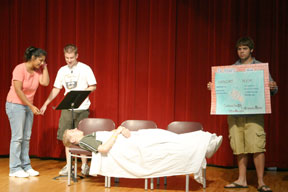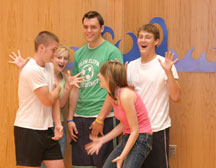It’s a camp unlike any Ford McAlexander had ever attended.
Wabash’s Opportunities to Learn About Business program is a week-long, jam-packed crash course in what it takes to succeed in the business world. Males and females going into their senior year of high school are eligible to attend.
 "I wasn’t expecting it to be easy or anything, but we’re going 100 percent," McAlexander said.
"I wasn’t expecting it to be easy or anything, but we’re going 100 percent," McAlexander said.
The Canterbury High School student from Ft. Wayne read about the program in his school newsletter and heard positive word-of-mouth experiences.
He came for academic growth and a crash course in business, marketing, advertising and the stock market.
The OLAB staff, made up of Wabash faculty and staff, lawyers, and past OLAB participants tried to make sure that happened for McAlexander and the other 48 attendees.
After an initial two and a half days consisting primarily of lectures on key concepts, the teens were faced with a labor negotiation that proved challenging.
A group of four lawyers, including three Wabash grads and an actual union negotiator discussed employee demands and benefits for imaginary companies and products each group of participants had created.
"It’s role playing on both sides," Wabash coordinator of donor relations Marilyn Smith said of the negotiations.
After lunch and speeches, participants were introduced to advertising concepts so that they could prepare their advertising campaign the next day. They later filmed 30- or 60-second commercials advertising their group’s imaginary personal digital assistant. They also designed visual ads to target specific customers.
 Alex Bucksot’s group "created" a device for busy parents. "This one probably has the largest range of consumers," Bucksot said of his group’s idea. He said the imaginary product could be used by stay-at-home mothers or fathers and professionals.
Alex Bucksot’s group "created" a device for busy parents. "This one probably has the largest range of consumers," Bucksot said of his group’s idea. He said the imaginary product could be used by stay-at-home mothers or fathers and professionals.
Meanwhile, McAlexander’s team came up with a device catering to a narrower group — surfers. The PDA of sorts would have access to beach cameras up and down the coasts, title waves and clean water updates and a global positioning system, among other features.
The program changed since it began in 1973, when PDAs were an invention-yet-to-come. The differences go beyond technology. The time commitment and number of students also decreased. The program is no longer 10 days long, and one session is offered instead of two.
"It’s kind of evolved and become more streamlined based on how busy high school students are in the summer," Wabash English professor Tobey Herzog said.
"I don’t think it’s diluted the quality of the program. In some ways it made it better," he said.
Teens are still presented with in-depth concepts.
"We’re taking a lot of the material that we would present to college students and adapting it for high school students," Herzog said.
The intense atmosphere provides a glimpse of the academic demands of college. It also helps prepare participants for the real business world "where people are having to do a lot of work under intense pressure in a short period of time and under deadline," Herzog said.
The experience also taught students teamwork and how to best utilize colleagues' strengths.
"We’re a different group from (when we started)," Allison Kontz, one of McAlexander’s teammates, said. "Now we all know each other’s personalities. I think it’s interesting to see what different people are good at," she said.
 Dick is a reporter for the Crawfordsville Journal Review.
Dick is a reporter for the Crawfordsville Journal Review.
In photos:
On homepage: OLAB's winners for the Best Managed Team.
On this page: Two of the groups present their TV commercials for the OLAB exercise.